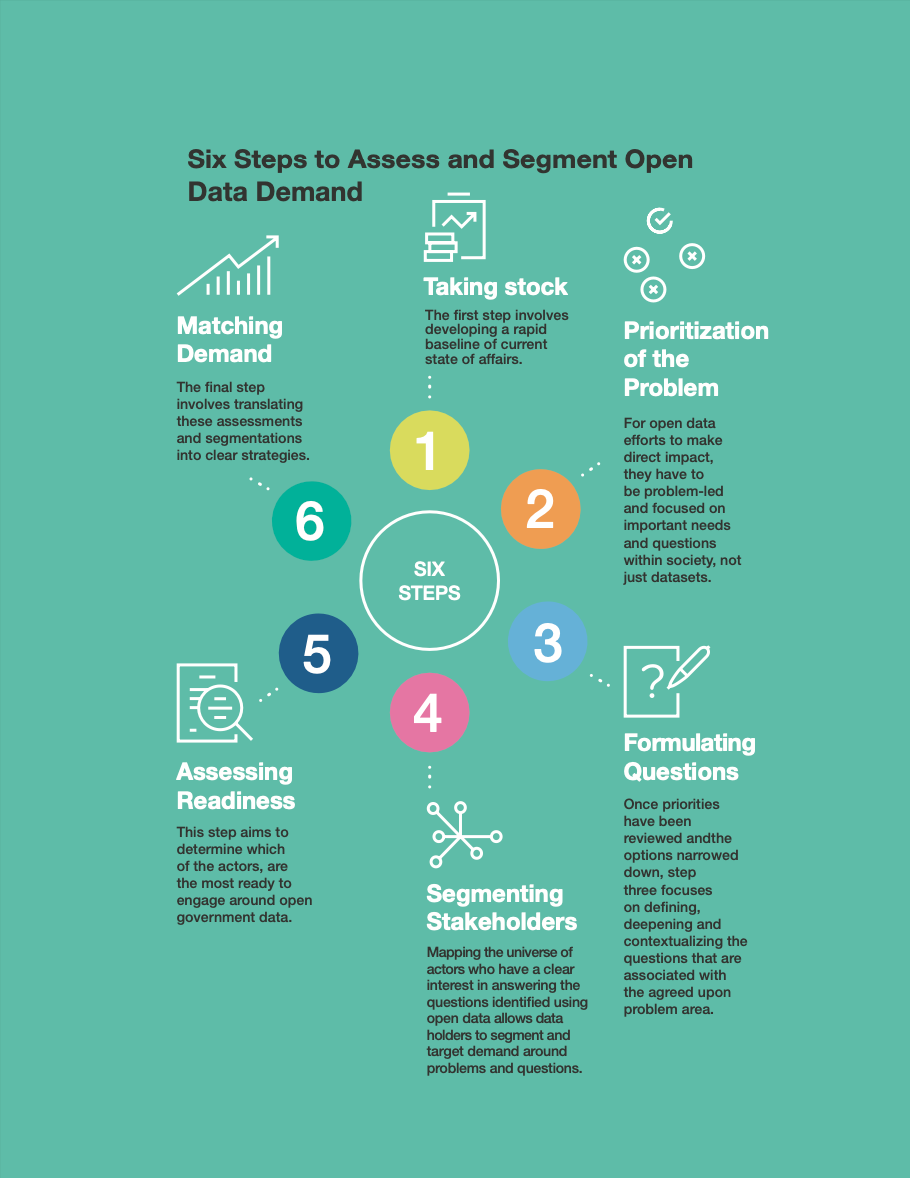Data Stewardship and COP26
Data Collaboration, and Reuse to Address Climate Change
A Collection of Resources from The GovLab Data Program
Posted on 2nd of November 2021 by Yuki Mitsuda
The United Kingdom is hosting the 26th UN Climate Change Conference of the Parties (COP26) in Glasgow from 31 October — 12 November 2021. The summit convenes constituents from around the world and across sectors to accelerate actions towards the goals of the Paris Agreement and the UN Framework Convention on Climate Change.
On the occasion of COP26 and to contribute to the discussion of how responsible data collaboration, stewardship and reuse can support climate objectives, we present a selection of initiatives and resources produced by The GovLab’s Data Program related to addressing climate change and its impacts, as well as environmental objectives more broadly.
Identifying the demand for Data4Climate
The 100 Questions — Air Quality and Food Systems Sustainability Domains


The GovLab’s 100 Questions Initiative seeks to map the world’s 100 most pressing, high-impact questions that could be answered if relevant datasets were leveraged in a responsible manner across different domains. Together with the World Resources Institute, The GovLab convened a community of Air Quality “bilinguals” — domain experts who also possess data science knowledge — to define an agenda for research and action in the space. The 10 questions developed by the bilinguals have been publicly prioritized and are now being socialized with key stakeholders to spur the design and implementation of purpose-driven data collaboratives. The bilinguals’ questions focus on a range of issues from identifying geographical source of pollution to achieving global carbon-free cities. Learn more here.
More recently, the GovLab, the Barilla Foundation, and the Centre for European Policy Studies (CEPS) launched the Food Systems Sustainability domain of the 100 Questions. A global cohort of food systems bilinguals are currently defining questions that, if answered through data and collaboration, could support sustainable solutions for healthier food production, distribution, and consumption. Learn more here.
Open Data Demand Assessment and Segmentation Methodology


In partnership with the Inter-American Development Bank and French Development Agency, the GovLab developed the Open Data Demand Assessment and Segmentation Methodology to provide open data policymakers and practitioners with an approach for identifying, segmenting, and engaging with demand. This methodology was developed and tested through a collaboration with the Presidency of Costa Rica aimed at better identifying and meeting the demand for government data that could support efforts to address climate change and minimize environmental degradation across the country.
Data4Climate case studies we can learn from
The GovLab has developed several case studies examining the design, implementation, impact, and key lessons learned from efforts to leverage data to advance environmental and climate objectives.
Open Data’s Impact is a hub for research into the global impact of open government data. Case studies with relevance to the COP26 community and objectives include:


- Aclímate Colombia: Open Data to Improve Agricultural Resiliency — Aclímate Colombia is a platform that leverages a diversity of data sources, including many open government datasets, to help farmers understand how to better navigate shifting weather patterns.
- NOAA Open Data Portal: Opening Up Global Weather Data in Collaboration with Businesses — Opening up weather data through the United States National Oceanic Atmospheric Administration (NOAA) has significantly lowered the economic and human costs of weather-related damage through more accurate forecasts; the development of a multi-billion-dollar weather derivatives financial industry; and the growth of a million-dollar industry of tools and applications derived from NOAA’s real-time data. Read the full report here.
- India’s ESMI: Civil Society Complementing Government Data in an Open Manner — India’s Electricity Supply Monitoring Initiative (ESMI), launched by an Indian NGO Prayas Energy Group (PEG), collects real-time power quality information by installing Electricity Supply Monitors in various locations in the city of Pune, India. Read the full report here.
The GovLab’s Data Collaboratives Explorer similarly highlights several climate and environment initiatives from around the world that stem from cross-sector data partnerships, often using data from private sector. Entries in the Explorer with relevance to COP26 include, for example:


- Data for Climate Action — a program that called upon researchers to harness data provided by the multinational banking company BBVA, the global telecommunications provider Orange, Waze, and others for climate-related activities;
- Big Data to Combat Air Pollution in Brazil — an initiative from LUCA, Telefonica’s big data unit, which combined cell phone data and open data from weather stations, air quality, and traffic sensors to analyze the air quality and predict traffic in certain locations in Sao Paolo, Brazil to inform municipal decision-making; and
- China Green Horizon — a project between Beijing’s municipal government and IBM Research to improve the accuracy of air quality assessments.
The GovLab also developed a detailed Data Collaborative Case Study on Global Fishing Watch, an independent nonprofit organization dedicated to advancing responsible stewardship of our oceans, visualizes, tracks, and shares real-time data on global fishing activity. In Data Stewardship in Action: Seeing the Forest for the Trees in Finland, we provide an introduction to Metsään.fi, Finland’s private forestry data pooling platform, as an example of data stewardship. As privately-owned forests account for 60% of Finland’s forest land, data sharing between the private and public sectors is crucial to protect the country’s ecosystem and economy.


Finally, AI Localism Repository gathers case studies on the governance of AI at the local level. The repository features several relevant examples to the subnational climate community, in particular, such as AI4Cities Climate Challenges, which explores how cities can solve their climate challenges using AI, focused on energy optimization in buildings.
[Photo Credit: Anna Urlapova on Pexels]
